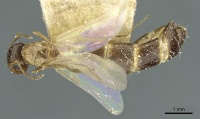Colobopsis pylora
| Colobopsis pylora | |
|---|---|

| |
| Scientific classification | |
| Kingdom: | Animalia |
| Phylum: | Arthropoda |
| Class: | Insecta |
| Order: | Hymenoptera |
| Family: | Formicidae |
| Subfamily: | Formicinae |
| Tribe: | Camponotini |
| Genus: | Colobopsis |
| Species: | C. pylora |
| Binomial name | |
| Colobopsis pylora (Santschi, 1920) | |
Identification
Distribution
Distribution based on Regional Taxon Lists
Oriental Region: Vietnam (type locality).
Distribution based on AntMaps
Distribution based on AntWeb specimens
Check data from AntWeb
Countries Occupied
| Number of countries occupied by this species based on AntWiki Regional Taxon Lists. In general, fewer countries occupied indicates a narrower range, while more countries indicates a more widespread species. |

|
Estimated Abundance
| Relative abundance based on number of AntMaps records per species (this species within the purple bar). Fewer records (to the left) indicates a less abundant/encountered species while more records (to the right) indicates more abundant/encountered species. |

|
Biology
Castes
Images from AntWeb

| |
| Syntype of Camponotus pylorus. Queen (alate/dealate). Specimen code casent0911630. Photographer Z. Lieberman, uploaded by California Academy of Sciences. | Owned by NHMB, Basel, Switzerland. |
Nomenclature
The following information is derived from Barry Bolton's Online Catalogue of the Ants of the World.
- pylora. Camponotus (Colobopsis) pylorus Santschi, 1920g: 184 (q.) VIETNAM.
- Type-material: holotype queen.
- Type-locality: Vietnam (“Cochinchine”): Saigon (Fouquet).
- Type-depository: NHMB.
- Combination in Colobopsis: Ward, Blaimer & Fisher, 2016: 350.
- Status as species: Santschi, 1920h: 174; Santschi, 1924c: 115; Emery, 1925b: 146; Chapman & Capco, 1951: 226; Bolton, 1995b: 119; McArthur, 2012: 178.
- Distribution: Vietnam.
Description
References
- Santschi, F. 1920g. Cinq nouvelles notes sur les fourmis. Bull. Soc. Vaudoise Sci. Nat. 53: 163-186 (page 184, queen described)
- Ward, P.S., Blaimer, B.B., Fisher, B.L. 2016. A revised phylogenetic classification of the ant subfamily Formicinae (Hymenoptera: Formicidae), with resurrection of the genera Colobopsis and Dinomyrmex. Zootaxa 4072 (3): 343–357 (doi:10.11646/zootaxa.4072.3.4).
References based on Global Ant Biodiversity Informatics
- Ogata K. 2005. Asian ant inventory and international networks. Report on Insect inventory Project in Tropic Asia TAIIV: 145-170.
- Santschi F. 1920. Fourmis d'Indo-Chine. Annales de la Société Entomologique de Belgique 60: 158-176.
- Santschi F. 1924. Fourmis d'Indochine. Opuscules de l'Institut Scientifique de l'Indochine 3: 95-117

